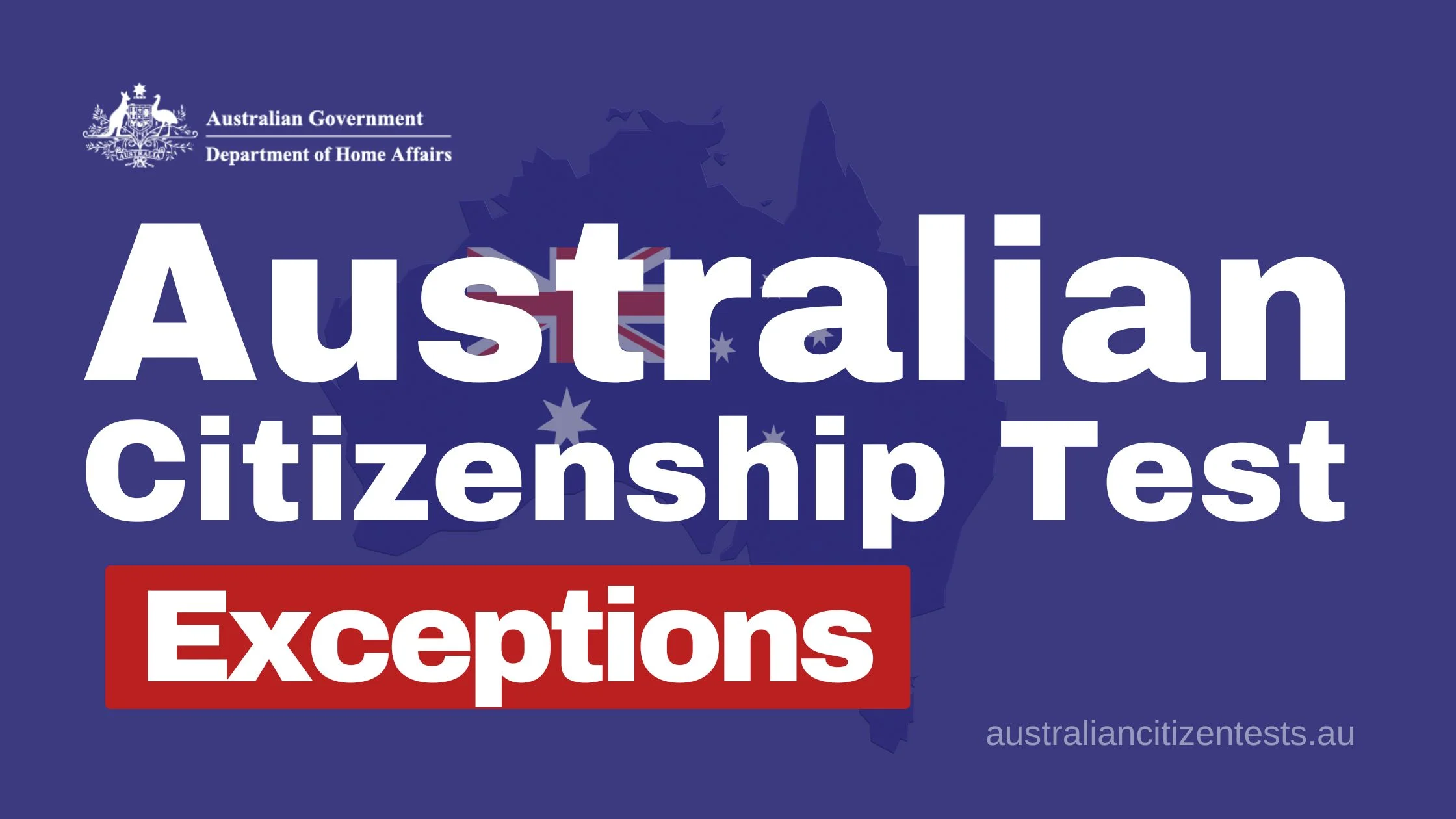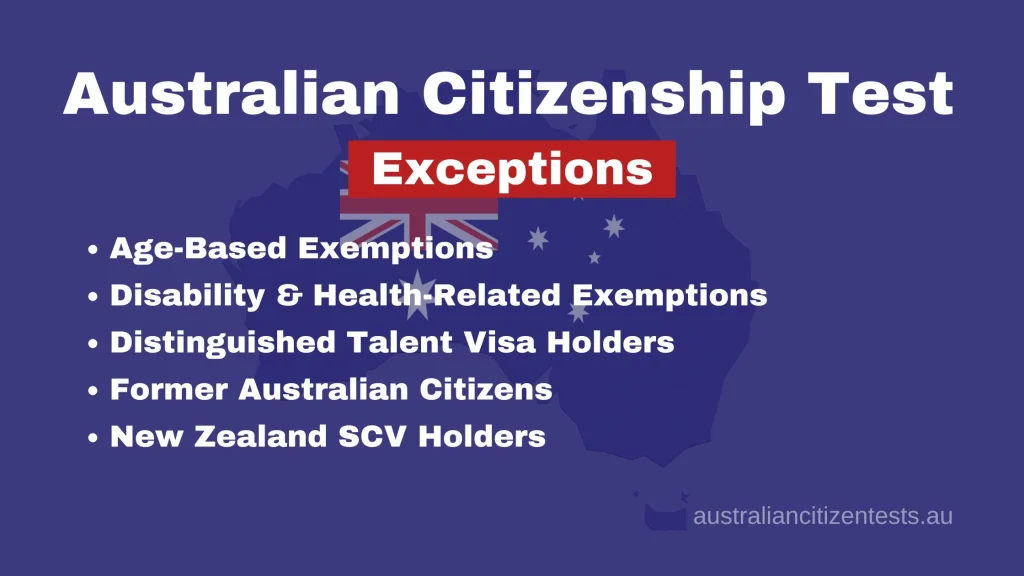
Some individuals may find it difficult to take the Australian Citizenship Test due to age or health issues. To support them, the government offers exemptions, ensuring the process is fair and considers personal situations.
To get an exemption, applicants must provide medical proof from a certified doctor. This proof should show a lasting physical or mental condition that makes it hard to understand the application, show basic English skills, or grasp the duties of being an Australian citizen. Clear and detailed medical proof is essential. Even with an exemption, applicants must meet other criteria, like living in Australia for a certain time and having good character. The exemption only applies to the test part of becoming a citizen.

Age-Based Exemptions (Applicants Under 18 or Over 60)
If you’re under 18 or over 60, you don’t have to take the Australian citizenship test. This rule comes from the Citizenship Act 2007, a law that sets citizenship rules. However, you still need to meet other requirements, like having permanent residency (PR) and living in Australia for a certain time.
For example:
- A 16-year-old applying with their parents must live in Australia for the required period.
- A 65-year-old with PR must prove they’ve lived in Australia for at least four years.
These age waivers (exemptions) exist because younger people are still learning, and seniors already have life experience. But everyone must follow rules like good behaviour and submitting the right paperwork.
Disability & Health-Related Exemptions
Applicants with severe disabilities or health conditions may be exempt from taking the Australian Citizenship Test, provided they submit medical documentation supporting their condition.
Permanent Physical or Mental Incapacity
Applicants with a permanent physical or mental incapacity—like conditions present from birth (congenital), stroke effects, or serious depression—might not need to take the Australian Citizenship Test. To apply for this exemption, you must:
- Provide Medical Certification: Give documents signed by a doctor or psychologist. These papers must explain how your condition makes it impossible to take the test.
- Submit Supporting Evidence: Include extra proof, such as enrollment in the National Disability Insurance Scheme (NDIS) or detailed medical records showing your treatment history.
For example:
- A person with severe dementia could use hospital reports to show they cannot take the test.
- Someone paralyzed after a stroke might provide rehab records to prove their incapacity.
These rules ensure fairness, but you must still meet other requirements—like signing the Australian Values Statement—to qualify for citizenship.
Sensory Impairments
People with serious sensory disabilities—such as blindness or being completely deaf—may skip the test if they:
Provide Specialist Reports: Submit official documents from experts. For example:
- A blind person could give a report from an eye doctor (ophthalmologist).
- A deaf person might include hearing test results from an audiologist to prove “substantial impairment.”
Even if you don’t take the test, you must still show you understand and agree to the Australian Values Statement. The Department of Home Affairs might ask for more proof, like Braille documents or records of sign language help, to ensure you get the support you need.
Special Residency Cases
Confinement in Prison or Psychiatric Institutions
If someone has been in prison or a psychiatric hospital for a crime, they usually must live in Australia for four years after release before applying for citizenship. This is called the four-year post-release residency rule.
However, the government can make exceptions. For example:
- If the person was wrongfully convicted (found innocent later).
- If they received a pardon (official forgiveness for the crime).
- For compassionate reasons, like serious illness.
The Department of Home Affairs (Australian immigration authority) decides these cases. They might consult the Mental Health Tribunal (a mental health review board) for people in psychiatric care.
Distinguished Talent Visa Holders
People with a Distinguished Talent Visa (subclass 858)—like top athletes, artists, or skilled professionals—have easier residency rules for citizenship.
To qualify, they must:
- Live in Australia for 480 days (about 1.3 years) within four years.
- Be a permanent resident for 120 days (about 4 months) in the year before applying.
The Australian Sports Commission (sports authority) or Global Talent program (for top professionals) often sponsors these applicants. The Department of Home Affairs prioritizes them because they boost Australia’s reputation in sports, tech, or arts.
Partial Exemptions Under s22(2)
Some applicants can apply for citizenship with reduced residency requirements under Section 22(2) of the Citizenship Act 2007. These exemptions apply to:
Born in Australia:
- If you were born in Australia, you only need 12 months as a permanent resident to apply for citizenship.
- Example: A child born in Australia to parents on temporary visas can apply after their family becomes permanent residents.
Former Australian Citizens:
- If you were an Australian citizen before but lost your citizenship (e.g., to get another passport), you can regain citizenship faster.
- You must prove your past citizenship and meet basic residency rules.
The Department of Home Affairs still checks your character and language skills, but the Citizenship Act 2007 makes the process simpler for these groups.
New Zealand SCV Holders
New Zealand citizens living in Australia on a Special Category Visa (SCV) have special residency rules. Under the Trans-Tasman Travel Arrangement, time spent outside Australia can still count toward citizenship if they returned to Australia within 8 years before applying.
The Department of Home Affairs checks eligibility using an “8-year rolling window”—this means any time outside Australia over 8 years doesn’t count. SCV holders must still pass the citizenship test, prove good character, and show they want to stay in Australia. These NZ concessions and SCV residency rules make citizenship easier for long-term New Zealand residents.
Ministerial Discretions
Administrative Errors (Government Mistakes)
If government mistakes (like visa delays or wrong advice) caused gaps in your residency, you might get an exemption. To apply:
- Show proof, like official letters admitting the error.
- Explain how the mistake affected your residency (e.g., delayed visa approvals).
Under Citizenship Act Section 22(4A) & (5), the government can waive residency rules for these errors. For example, if your PR application was stuck for years due to paperwork issues, you could ask for flexibility.
Significant Hardship/Disadvantage
If you face serious problems—like long family separation, major money troubles, or health issues—you might qualify for an exemption. You need to:
- Provide proof, like medical reports or bank statements.
- Show how these problems are linked to your citizenship delay.
Norfolk Island residents (due to their remote location) often get these exemptions. The Department of Home Affairs reviews these cases for fairness but still checks if you meet basic citizenship standards.
Children of Former Citizens
Children born in Australia to stateless parents or former Australian citizens may get citizenship automatically. This applies even if their parents lost citizenship or lack any nationality.
Example:
- A child born in Sydney to stateless parents (with no citizenship anywhere) becomes an Australian citizen at birth.
- A child of a parent who gave up Australian citizenship might qualify under Citizenship by Descent.
Spouses, Partners, and Families
If you’re married to or in a de facto relationship with an Australian citizen, you might get residency flexibility for citizenship. To qualify:
- Prove your “close and ongoing relationship” with documents like shared bills, photos, texts, or travel records.
- Show you’ve lived together (e.g., lease agreements) or visited Australia frequently.
Under Section 22(6) of the Citizenship Act, the Department of Home Affairs may waive strict residency rules if your partner is Australian. For example, a spouse on a Partner Visa could apply faster if they’ve maintained strong ties to Australia.
Residency Start Date Flexibility
If you were outside Australia when your residency period officially started, you might still qualify for citizenship. This applies if you had a valid permanent visa (subclass 189/190) during the four-year period needed for citizenship.
This rule helps people with unavoidable delays, like work trips or moving delays. For example, if you had to stay overseas for a job but kept strong connections to Australia (like family here or owning property), you could still apply.
You’ll need to:
- Prove your visa was still valid during those four years.
- Show you plan to keep living in Australia.
FAQs
Who is exempt from taking the Australian citizenship test?
Applicants under 18, over 60, or with permanent disabilities (e.g., blindness, severe depression) are exempt. Proof like medical certificates or NDIS enrollment is required.
Can hearing loss exempt me from the citizenship test?
Yes. If you provide audiologist reports confirming “substantial impairment,” you may skip the test. You must still understand the Australian Values Statement.
Do spouses of Australian citizens need to take the test?
No. Spouses/de facto partners of citizens can request exemptions under Section 22(6) if they prove a “close and continuing relationship” (e.g., shared property, frequent visits).
Are New Zealand SCV holders exempt from residency rules?
No, but they get residency flexibility. Time outside Australia counts if they re-entered within 8 years before applying, under the Trans-Tasman Travel Arrangement.
